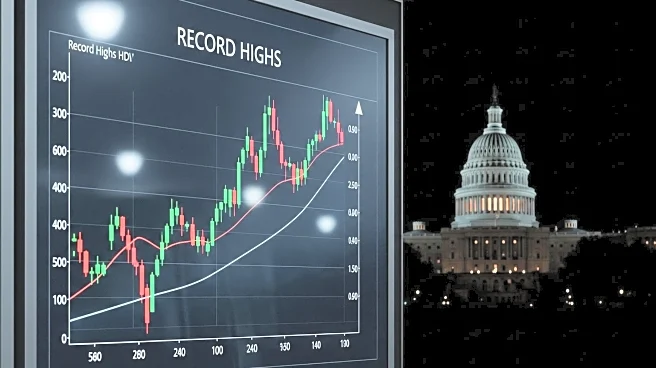What is the story about?
What's Happening?
The U.S. government shutdown, caused by a deep partisan rift in Washington, is a major focus for investors as the markets enter the fourth quarter. Despite the shutdown, the S&P 500 has reached record highs, increasing by 14%. The shutdown risks delaying crucial economic data, which could affect the Federal Reserve's policy-easing outlook. Investors are concerned that the lack of timely economic data could lead to confusion regarding the Fed's monetary policy path. However, analysts expect S&P 500 companies to report an 8.8% increase in earnings for the third quarter, up from earlier forecasts. The shutdown is anticipated to last two to four weeks, potentially impacting economic growth.
Why It's Important?
The government shutdown's impact on economic data could create uncertainty in the Federal Reserve's decision-making process, affecting monetary policy. This situation poses a risk to economic growth, as timely data is crucial for informed policy decisions. Despite these concerns, the stock market has shown resilience, with the S&P 500 reaching record highs. The shutdown's duration and its effects on economic data could influence investor sentiment and market stability. The fourth quarter is historically strong for the S&P 500, which may provide some optimism for investors despite the current political impasse.
What's Next?
Investors will closely monitor the release of the Federal Reserve's meeting minutes to gain insights into policymakers' thoughts during the recent rate cuts. The upcoming earnings season, with reports from companies like Levi Strauss and Delta Air Lines, will provide further clarity on corporate performance. If the shutdown extends, additional rate cuts could stimulate the economy, potentially leading to a re-acceleration of growth once the government resumes operations. The market's momentum and historical fourth-quarter strength may continue to support equities, but the shutdown remains a key factor to watch.
Beyond the Headlines
The shutdown highlights the ongoing partisan challenges in Washington, which could have long-term implications for economic policy and governance. The delay in economic data may lead to increased reliance on alternative indicators, potentially shifting how investors and policymakers assess economic health. The situation underscores the importance of political stability in maintaining economic confidence and growth.















